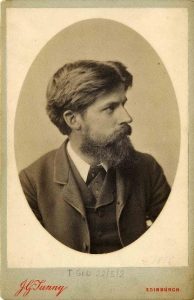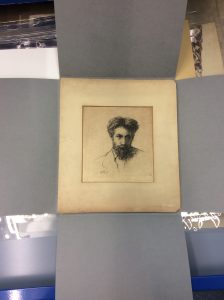Last week our Project Conservator, Nicole Devereux, wrote about how she had uncovered an unusual sticky situation among the Patrick Geddes Collection photographs. Rising to the conservation challenge, Nicole explored some fascinating and experimental conservation processes in order to resolve this particular problem. Read more about Nicole’s work here.
Category Archives: Conservation
Crowdsourcing Event at Strathclyde University
On 19th and 20th February 2018, we are holding a conservation crowdsourcing event here in Archives and Special Collections at the University of Strathclyde. Our aim, over the two days, is to rehouse the Patrick Geddes papers, one of our most important archive collections, in acid-free folders and boxes. Patrick Geddes (1854-1932) was one of the greatest social thinkers of his time. He was a biologist, sociologist and pioneering town planner, with a fascination for the organization of human societies and their spatial manifestation in the city and country. The collection vividly documents the development of all his theories and is of international significance. It comprises correspondence, notes, news cuttings, pamphlets, books, photographs, maps, plans, prints and drawings, including Geddes’ famous ‘thinking machines’. You can find out more about it here.

Patrick Geddes
The collection is poorly housed in unsuitable folders and other packaging. As a result, many pages were torn or creased. An extensive programme of conservation to repair the torn pages alongside cleaning to remove surface dirt has just been completed but, to ensure that the collection is properly protected and that no more damage occurs, we need to rehouse it in archival quality acid-free folders. Over the two days, we aim to rehouse the contents of 175 archive boxes.

Geddes papers in the Archives store
Each day will begin with a training session in the morning, followed by practical work. In the afternoon, participants will be joined by staff members from Archives and Special Collections who will talk to them about their roles. Complimentary refreshments and catering will be provided throughout the day to encourage networking during break times.
This is a great opportunity to get some hands on experience with archives, and find out what it’s like to work in Archives and Special Collections at the University of Strathclyde.
Places are limited to 13 participants per day. You can book your place through Eventbrite. If you have any questions, please email victoria.peters@strath.ac.uk.
Booking will close on 11 February, to allow us to organise catering.
Timetable
9.30 – 9.45: Welcome
9.45 – 10.00: Introduction to the Geddes collection
10.00 – 10.30: Rehousing training
10.30 – 11.00: Rehousing begins
11.00 – 11.30: Tea break (refreshments provided)
11.30 – 13.00: Rehousing
13.00 – 14.00: Lunch break (lunch provided)
14.00 – 15.30: Rehousing and networking
15.30 – 16.00: Tea break (refreshments provided)
16.00 – 17.00: Rehousing and networking
Conserving Patrick Geddes
I am very excited to be working on the ‘Evergreen: Patrick Geddes and the Environment in Equilibrium’ project as Project Conservator which runs for 10 months. During my first month on the project I have been getting to grips with the collection which is split over Strathclyde University in Glasgow and Edinburgh University. Whilst looking through the collections I have come across a variety of different media including photograph albums, photographs, glass plate negatives, and transparent paper, loose sheets of correspondence and drawings.

A portrait of Patrick Geddes
The majority of the collection requires rehousing, flattening and minor paper repairs. Tearing of the paper collection has been caused by years of handling and inappropriate storage. To repair them remoistenable tissue with gelatine is being used. This method is being used because of the different types of inks used throughout the collection which are sensitive to moisture. It is also a faster repair method for a larger collection. The rehousing will consist of new archival folders for the collection housed in 180 archival boxes and three different sizes of melinex sleeves for the larger items in plan chests. We also hope to set up a crowdsourcing event to help rehouse the 180 boxes.

Survey Graphic magazine in need of paper repairs
